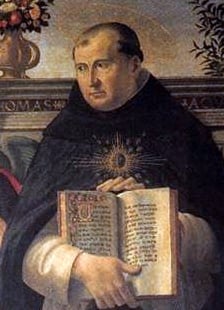 St. Thomas Aquinas
St. Thomas Aquinas
Scripture: Lectionary # 317. Hebrews 9:15.24-28. Psalm 98:1.2-3.3-4.5-6. Mark 3:22-30:
There is a strong contrast in the two readings from Hebrews and Mark. The first gives us great hope for salvation. The second warns us against the unforgiveable sin against the Holy Spirit.
In Hebrews we learn how Jesus’ sacrificial death is a once and for all sacrifice that brings salvation. “Christ was offered up once to take away the sins of many (all).” He will come again to bring salvation to those who eagerly await him.” Jesus’ very name means “salvation” and is based on the Hebrew verb that means “to save, to redeem, to heal.” Thus the name of Jesus is a holy name inspiring us to revere it always and never to use it in vain. We have to be conscious of God’s presence in order to avoid misuse of the Holy Name of Jesus.
The Psalm continues with the prayer in hymn form that has this powerful verse: “The Lord has made know his salvation; in the sight of the nations he has revealed his justice. He has remembered his kindness and his faithfulness to the house of Israel.” Thus boththe People of God, Israel, and all the peoples are included in the salvation coming from God to all of us.
From this positive message of forgiveness of sin and promise of salvation we have the contrast of Mark’s continuing third chapter which is an attack on the very person of Jesus’ integrity. Verse 29 is the most difficult statement in the New Testament about what cannot be forgiven. “Whoever blasphemes against the Holy Spirit will never be forgiven.” The exegetes have very different opinions about this verse. In looking at three from different countries ( U.S.A., England, and Ireland) we have some insight into this verse. Fr.Daniel Harrington, S.J. states, “In the Marcan context the unforgiveable sin is attributing the work of the Holy Spirit in Jesus’ healings to the power of Satan.” The Dominican exegete, Wilfrid Harrington from Ireland, it is the act of saying Jesus’ exorcisms are the work of the Devil which then consists in refusing to accept the kingdom of God is among us. Again, this thought harkens back to the beginning of chapter three where Jesus is said to do what he does through Beelzebul, the prince of demons. The third scholar, who is one of the greatest commentators on Mark, says, “It is a perversion of spirit, which in defiance of moral values, elects to call light darkness. …Whether we admit the possibility of such a sin unto death (I John v.6) will depend on whether we believe there are final limits to which human self-assertion and self-worship can go, on our knowledge of life and history, and most of all on our recognition of the fact that the warning is that of Jesus. Of all religious teachers no one was less inclined than He to minimize possibilities of forgiveness and amendment and the boundless resources of divine grace.” (Taylor was from England). Amen.
Copyright 2013 Fr. Bertrand Buby, S.M.
About the Author

Guest
We welcome guest contributors who graciously volunteer their writing for our readers. Please support our guest writers by visiting their sites, purchasing their work, and leaving comments to thank them for sharing their gifts here on CatholicMom.com. To inquire about serving as a guest contributor, contact editor@CatholicMom.com.


.png?width=1806&height=731&name=CatholicMom_hcfm_logo1_pos_871c_2728c%20(002).png)
Comments